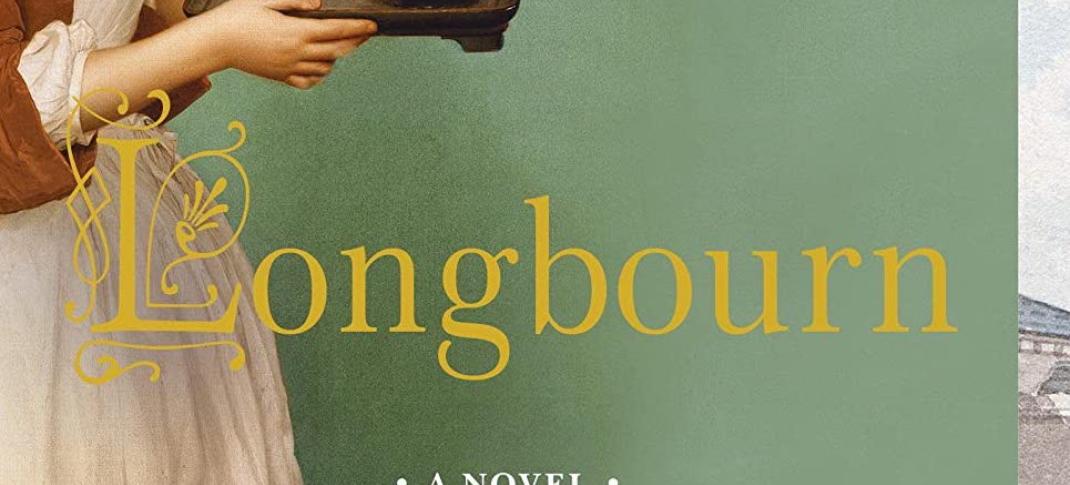Why You Should Read Jo Baker's "Longbourn" Now That 'Sanditon' is Over

Though its finale aired several weeks ago, we're all still talking about Sanditon - what worked and what didn’t, and the fact that a second season seems more and more unlikely, despite the efforts of diehard fans. Was the TV series showrunner Andrew Davies’ homage to author Jane Austen, an attempt to complete the story the way she herself might have done had she gotten the chance? Or is the series just Davies having fun playing with the tropes of the novels, creating the equivalent of very expensive fan fiction?
The answer isn't entirely clear - and may actually be a bit of both options - but Davies isn’t the only one creating new content by riffing on Austen’s original work. The author's favorite niece Fanny Knight was the first writer to attempt to finish Sanditon, after all. There is also a massive literary subgenre of Austen variations, mostly written by women for women, and to a very great extent inspired by Davies’s television adaptation of Pride and Prejudice. (Because we just can’t get enough of Lizzy and Darcy and the idealized pretty world of that 1996 BBC version, can we?) These novels play on alternate plots, sequels, prequels and all sorts of connected ideas: What if Lizzie accepted Darcy’s first proposal? What if Mr. Bennet died during the course of the novel, throwing his family into poverty? What about Mary and Kitty? What if… the possibilities are seemingly endless, and the appetite of the intended audience bottomless.
A few writers have created their own spin on the original tale, often with mixed results. P. D. James wrote a sequel/mystery, Death Comes to Pemberley, presented by PBS' Masterpiece a few years ago. Pride/Prejudice: A Novel of Mr. Darcy, Elizabeth Bennet and Their Other Loves by Anne Herendeen introduces slash into Pride and Prejudice fan fiction. And author Naomi Novik’s splendid Dragons and Decorum (Golden Age and Other Stories) introduces Captain E. Bennet of the Seventh Wing and her dragon Wollstonecraft.

But the book I’m talking about today, Longbourn by Jo Baker (2013) does not fit neatly into any of the above categories. Although it is based on Pride and Prejudice—embracing even the three-volume format—it gives us an entirely different viewpoint. That of the servants behind the scenes.
British novelist Martin Amis described his first reading of Pride and Prejudice in a 1998 essay, The Genius of Jane Austen (and What the Adaptations Get Wrong) Or: Trapped in a Movie Theater with Salman Rushdie, c. 1996.
When I was introduced to the novel, at the age of 15, I read 20 pages and then besieged my stepmother’s study until she told me what I needed to know. I needed to know that Darcy married Elizabeth. (I needed to know that Bingley married Jane.) I needed this information as badly as I had ever needed anything.
I found the story of Longbourn’s lovers, Sarah and James, equally compelling. But they are servants, since Baker’s remarkable reconstruction of the novel is Pride and Prejudice from the downstairs point of view. It is not always an easy read, and it contains episodes of great brutality and horror as well as moments of heart-stopping beauty.
Austen named one servant, Mrs. Hill the housekeeper, who in Baker’s retelling is also the cook, and briefly mentions a nameless butler, footman, and second housemaid. Every time a visitor arrives, an errand needs to be run, a horse saddled or harnessed to the carriage, a meal or tea prepared and served—the invisible inhabitants of the Bennets’ house swing into action. Netherfield may be let at last, but that’s not welcome news to the servants.
A young, unmarried gentleman, newly arrived to the neighbourhood. It meant a flurry of excited giggly activity above stairs; it meant outings, entertainments, and a barrowload of extra work for everyone below.
The everyday work is arduous enough. Here’s the housemaid, Sarah, beginning her day.
The air was sharp at four thirty in the morning, when she started work. The iron pump-handle was cold, and even with her mitts on, her chilblains flared as she heaved the water up from the underground dark and into her waiting pail. A long day to be got through, and this just the very start of it. All else was stillness. Sheep huddled in drifts on the hillside; birds in the hedgerows were fluffed like thistledown; in the woods, fallen leaves rustled with the passage of a hedgehog; the stream caught starlight and glistened over rocks. Below, in the barn, cows huffed clouds of sweet breath, and in the sty, the sow twitched, her piglets bundled at her belly.
Baker’s prose is breathtaking, the harsh realities of everyday life juxtaposed with meltingly luscious descriptions of the natural world. Sarah is not immune to the beauty surrounding her, but she wonders if a world exists where you don’t have to wash someone else’s linen.
She accepts that her birth and status dictate that she will always work, and probably always as a servant. Sarah, ambitious, intelligent, and fearless, wants more from life, despite the comfort and affection of the tight-knit community downstairs, of which Mrs. Hill is justly proud:
There was so much to be thankful for: there was pleasure in her work, in the rituals and routines of service, the care and conservation of beautiful things, the baking of good bread and the turning of rough, raw foods into savoury and sustaining meals. There was pleasure, too, in the little clutch of people that she now had clustered around her.
But Baker doesn’t sentimentalize the downstairs community or romanticize its relation to upstairs (we are definitely not at Downton Abbey), and as the book progresses we learn of the devastating secrets that both servants and masters hold.
It comes as a surprise to learn that the servants are very much in favor of Mr. Collins (Mr. Bennet’s cousin and heir) and they go to great lengths to make him comfortable—and to save their jobs when he inherits the propery. To them, he’s not a pompous buffoon, but a young man unsure of himself among the riotous Bennets. They are rooting for Mary as his bride, rather than Lizzy or Jane, but are quite satisfied when Mr. Collins becomes engaged to Charlotte Lucas.
You may find yourself not liking Lizzy and Jane much in this retelling. While we may admire Lizzie fearlessly striding across the countryside, Longbourn reminds us that someone else cleans her stockings and petticoats. The sisters are shallow, pretty, and entitled, although kind enough to the servants—Lizzy lends Sarah books and gives her cast-off clothes. But when new rosettes are needed for the dancing shoes the Bennet sisters plan to wear at the Netherfield ball, Sarah is sent to to pick them up in pouring rain. Sarah finds that it’s difficult to take seriously people whose linen she has to launder, chamber pots she empties, and who suffer from a privileged inertia.

In one telling scene, Sarah, heartbroken by the disappearance of her lover James Smith, works up the courage to ask Lizzy if he has possibly gone with the militia to Brighton.
Elizabeth’s expression cleared. “Oh! Smith! You mean the footman!”
“Yes.”
“You called him Mr. Smith, that’s why I misunderstood you; I thought you meant someone of my acquaintance. I thought you meant a gentleman.”
The militia and the Napoleonic Wars play a major part in the book, with Wickham being particularly unsavory. This is not always an easy book to read.
Baker, as Austen does in Sanditon, introduces a person of color, Tol (Ptolemy) Bingley, who is probably Mr. Bingley’s half-brother. He is beautiful, exotic, ambitious, and initially dazzles Sarah.
An African? But Africans were cross-hatched, inky, half-naked and in chains. That plaque she had seen at the parsonage, hanging in the hallway: Am I not a man and a brother? This fellow, though, was immaculate in his livery, and his skin was not scribbly at all, but beautifully smooth and clear. He was indeed hardly darker than Mr. Smith, or any local man who worked the fields in the August sun. Though with them, the brown faded with the winter, and only ever extended as far as their shirt collar and rolled-back sleeves …
I haven’t mentioned Mr. Darcy for a reason. He barely appears, occasionally striding through a front doorway, one time scattering the tea leaves that Sarah uses to clean the floors. In Sarah’s words,
... Mr. Fitzwilliam Darcy, who is such a polished meaty thing that he makes me slip, for a moment, out of this world entirely, and I become a ghost-girl who can make things move but cannot herself be seen.
Longbourn has been criticized for dwelling on the dark side of life and toppling the elder Bennet sisters from their pedestal, but the book has a raw, compelling honesty and a beautifully developed love story with a courageous, strong heroine.
Have you read Longbourn or any other Austen-adjacent novels or fan fiction? And do you consider Sanditon Andrew Davies’s fan tribute?



